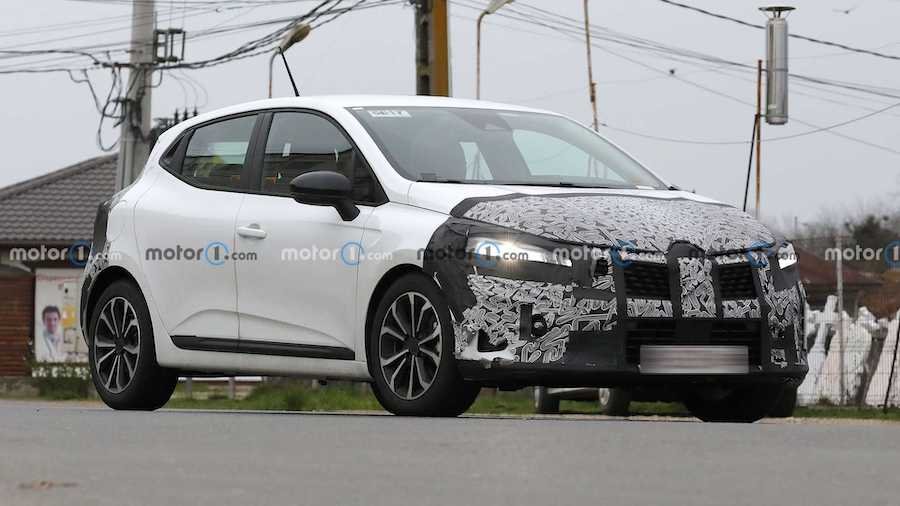New 2023 Renault Clio survives petrol supermini exodus

The future of the Renault Clio is set to be safeguarded by a dramatic update in the coming months, making it one of a select few ICE superminis to remain on sale in the face of various headwinds.
The French hatchback will receive a radical styling overhaul with a new, sharper front end featuring slimmer LED headlights placed above large, arrow-shaped daytime running lights – hidden by camouflage in these latest spy images.
The test car’s rear end shows off redesigned brake lights and a more angular bumper. The images also reveal a long exhaust pipe protruding from the body, hinting at airflow testing for a tweaked petrol powerplant.
It's expected that any upgrades are targeted at making the Clio’s engine – either the regular 89bhp TCe 90 or the 143bhp E-Tech hybrid – compliant with the incoming Euro 7 emissions regulations. Neither unit is likely to improve in performance, a slight decrease in power and torque output being a likelier result of the new rules.
The interior is expected to benefit from an uplift in material quality in line with Renault’s recently pledged push for profit, integrating more soft-touch materials around the dashboard and doors.
The 9.3in infotainment touchscreen currently reserved for the RS Line and E-Tech Engineered trim levels may become standard equipment.
More advanced driver-assistance systems will become standard equipment in order to comply with new GSR2 safety standards. The legislation – which all cars currently on sale must meet by 2024 – forces the inclusion of technologies including driver drowsiness detection, lane-keeping assistance and intelligent speed adaptation (speed limit warnings).
Given the adaptations required to comply with Euro 7 and GSR2, the Clio’s price is expected to rise significantly. Renault Group CEO Luca de Meo has previously warned that Euro 7 alone could add up to €2000 (£1750) to the sale price of a new car, due to the resultant engineering costs.
Prices may also increase as a result of the profit push sought by de Meo’s Renaulution strategy, which is pushing Renault upmarket. For example, the new Renault Austral SUV's Iconic Esprit Alpine trim costs €45,300 (£39,600) in France, when the range-topping version of its predecessor, the Kadjar, cost just £28,200 in the UK before it bowed out in 2021.
The Clio may receive a similarly conceived premium range-topper aimed at snatching sales from the likes of the Audi A1 Sportback and Mini Cooper 5dr.
Nonetheless, an entry-level trim aligned with the current Evolution specification – which is priced from £19,095 – is likely to remain in the line-up, targeting buyers of mainstream models such as the Ford Fiesta.
The Fiesta will go off sale this summer, and the Volkswagen Polo also faces the axe, with Euro 7 threatening to increase its price by as much as €5000 (£4400).
Other than Renault, few manufacturers – such as Hyundai – have committed to producing small cars in the long term, as the market (and legislation) increasingly favours more profitable SUVs.
Unlike the Mini, the Clio won't gain an electric option. In 2025, it will be joined – not replaced – by another B-segment hatchback, the Renault 5, which is planned to be cheaper than the current Renault Zoe and rivals such as the Peugeot e-208.
